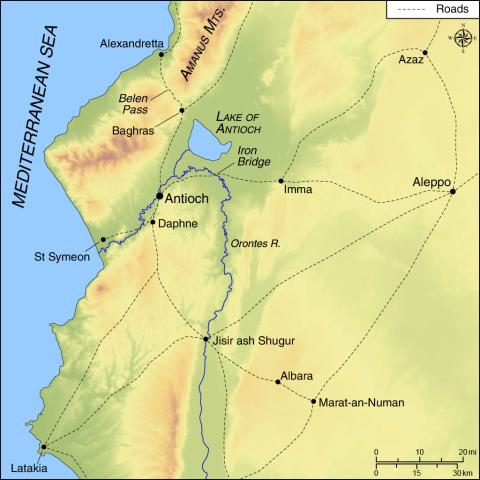Kerbogah Tries to Retake Antioch
[9.22.5] Curbaram dēnique, valdē dolēns intimīs vīsceribus, audītīs māternīs sermōnibus, respondit: “Māter cārissima, quaesō tē, quis dīxit tibi ista dē gente Chrīstiānā, quod deus eōrum tantum eōs amet, et quod ipse pugnandī virtūtem in sē retinet maximam, et quod illī Chrīstiānī vincent nōs in Antiochēnō proeliō, et quod ipsī captūrī sunt nostra spolia, nōsque persecūtūrī magnā victōriā, et quod in hōc annō moritūrus sum morte subitāneā?” Tunc respondit eī māter sua dolēns: “Fīlī cārissime, ecce sunt plūs quam centum annōrum tempora, dē quibus inventum est in nostrā pāginā et in gentīlium volūminibus, quoniam gēns Chrīstiāna super nōs foret ventūra et nōs ubīque vīctūra ac super pāgānōs rēgnātūra; et nostra gēns illīs ubīque erit subdita. Sed ignōrō, utrum modo an in futūrō sint haec ēventūra. Ego, utique misera sum, tē secūta ab Aleph urbe pulcherrimā, in quā speculandō atque ingeniōsē rīmandō respexī in caelōrum astra, et sagāciter scrūtāta sum planētās et duodecim signa, sīve sortēs innumerās. In eīs omnibus repperī quoniam gēns Chrīstiāna nōs ubīque est dēvictūra, ideōque dē tē valdē timeō nimis maesta, nē ex tē remaneam orbāta.”
notes
(June 1098) Kerbogah asks his mother how she knows about the future, and she has two answers. First (she supposedly says), the domination of the Christians is predicted in both Muslim and Christian scriptures. Second, she has made a special study of astrology.
et quod ipse pugnandī virtūtem in sē retinet maximam: “and that he (deus eōrum) has in himself such great courage in fighting.” CL would be present subjunctive (rarely), or acc. + inf.
nōsque persecūtūrī magnā victōriā: nōs is accusative.
sunt plūs quam centum annōrum tempora, dē quibus: “there have been more than a hundred years, since which.”
in nostrā pāgīnā: i.e., in the Koran.
et in gentīlium volūminibus: i.e., in the Bible.
quoniam gēns Chrīstiāna super nōs foret ventūra: "That the Christian race will come against us"; foret = esset (CL).
sīve sortēs innumerās: “and all kinds of omens” (Hill).
nē ex tē remaneam orbāta: “that I would be deprived of you”; CL would be nē tē orbāta sim.
vocabulary
tantum: to such an extent (OLD B.7)
subitāneus –a –um: sudden
pāgina –ae, f: a piece of writing, pages (OLD 1c)
utīque: without doubt, absolutely
rīmor (1): to examine, explore
sors sortis, f: fortune (OLD 8)
orbō (1): to deprive, make childless

